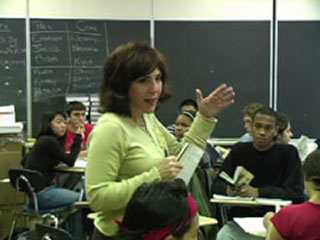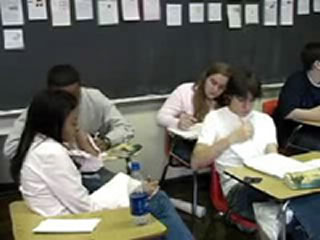Interrogating Macbeth: Crafting a Literary Analysis
When I was an English major, in 1970, The academy
was so in the grip of new criticism that we didn’t know anything
else. It took me a really long time to understand the new criticism
wasn’t the only way of looking at text. It was the only
way I had been taught to look at text; I hadn't been introduced
to the idea of reader response, of feminist criticism, of Marxist
criticism, of Freudian criticism, all the other ways of looking at
text. Without beating kids up or hitting them over the head with
really heavy theory, I invite them into the conversation about ways
of looking at literature.
In crafting the lesson on analytic essay writing, one of the things
I realized was that students needed very specific guidelines in writing
analytic essays. They weren’t familiar with the genre, the
purpose, the language, the conventions. In much the way that Lisa
Delpit talks about teaching her students the specifics of the language
of power, I realized that I needed to teach my students the specifics
of this kind of academic discourse. They didn’t know it. Some
of them could intuit it from reading other essays, but most of them
couldn’t. I
analyzed the elements of a literary essay and in a very direct, explicit
way shared it with the class. They weren’t going to
figure it out on their own in the time frame that we had. Theoretically
I could have them do the same kind of interpretation and analysis
of literacy essays and figure it out but in the time frame it wasn’t
going to happen.
Towards the end of the Macbeth unit I
explicitly teach them how to write a literary paper. When we
were documenting the unit for this website, I had this young graduate
student in my class for part of that time, and she was really upset
with me that I was explicit and told them all the steps in how to
write the paper. And I said, “why?” and
she said, “well, nobody told me, you just have to figure it
out!”
But they don’t figure it out. There
are some students who will never intuit it. A literary analysis
is a particular way of writing with particular expectations, a form
of academic literacy. Writing about literature in a
particular way is something I’ve found they need to be shown
explicitly. And
in the process of my doing the analysis, I had to do the
analysis. In
order for me to explain it to them explicitly, I had to think long
and hard about what exactly is involved in that process –
the text-search, and the chart, the interpretation of the quote,
and the ordering of the quotes in some kind of logic or pattern.
I didn’t
just read that in a textbook, I figured it out by thinking about
it really hard: What kinds of processes do I have
to go through to write this kind of paper? How can I invite them
to see what some of those steps are?
I was also very specific as
well with the criteria for the paper. Students would be invited,
not even permitted, but invited to re-write, because what’s
the point of just giving them a C? There’s a whole assessment
sheet with 10 very specific things they were supposed to do, and
then they get their paper back with that sheet telling them which
things they did well and which things they didn’t do at all,
and they get to re-write. I believe that in terms of assessment,
what’s
the purpose of grading? Is it just to sort and rank,
or to offer some sort of insights that the students can use to get
better?
More:

